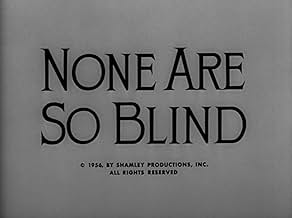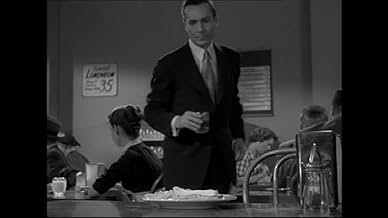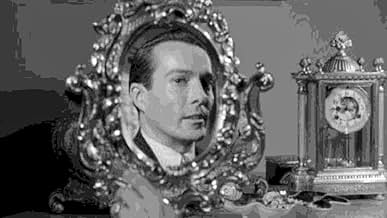An antiques dealer feels he should be enjoying the finer things in life, but his Aunt Muriel is the one with all the money. Finding another man's wallet gives him an evil idea.An antiques dealer feels he should be enjoying the finer things in life, but his Aunt Muriel is the one with all the money. Finding another man's wallet gives him an evil idea.An antiques dealer feels he should be enjoying the finer things in life, but his Aunt Muriel is the one with all the money. Finding another man's wallet gives him an evil idea.
- Director
- Writers
- Stars
- Director
- Writers
- All cast & crew
- Production, box office & more at IMDbPro
Featured reviews
Brilliant episode ...
Blind to evil
"None are So Blind" is worth watching enough for anybody on a 'Alfred Hitchcock Presents' binge and for anybody that loves the master of suspense (count me as one of those people). Yet it falls rather short of its potential. It is not one of the worst episodes of Season 2 but also not one of the best, up to this point none of the five episodes of the season have bowled me over. Stevens did direct better and worse, this is somewhere in the middle for him, and there are better and worse episodes of the series.
Am going to begin with the good. Hatfield is an elegant and later unnerving presence, which suited the role very well. Dunnock is in a role that plays to her strengths and she gives it plenty of grit. This is definitely a case of the cast being better than the episode. Hitchcock's bookending is intriguing and amusing as ever.
Furthermore, "None are So Blind" is solidly made, the photography having some nice atmosphere, there is some assured if not distinguished direction from Stevens and "Funeral March of a Marionette" is never going to stop being memorable. There is some nice suspense in the middle when Hatfield's character darkens. The script intrigues.
Having said all of that, "None are So Blind" is flawed. The story on the whole is pretty derivative, being too closely indebted to "The Perfect Murder" (except that episode was more realistic and suspenseful), occasionally silly and the suspense could have been more consistent.
Did feel that the script is too talky and that the episode goes too far in making Hatfield's character as hard to like as possible (making the aunt being so easily manipulated hard to buy or see much appeal in him). Will agree that the episode is most let down by the truly silly and too gimmicky ending. Being memorable but not for the right reasons.
In conclusion, acceptable but not exceptional. 6/10.
deserves a better review
Hurd Hatfield is a very good actor, and he was famous for his day because of Dorian Grey. He once said that Dorian Grey was both the best and worst thing that had ever happened to him. He is excellent in the role... perfect in fact, which is why the twist is such a shock. The supporting cast, especially the detective, are great, and it is a lovely episode and a lot of fun. As usual AH does some lovely stuff at the beginning.
Give this episode a chance. It is definitive Hitchcock presents and a lot of fun.
Too Gimmicky
Hatfield specialized in such fey parts beginning with The Picture of Dorian Gray (1945). Here his smooth face and elegant manner are quite believable. Dunnock too registers as the gritty aunt. But the payoff to his rather pedestrian plan is little more than a quirky gimmick that should have been re-thought. In passing-- I can't help noting KT Stevens' rather inessential role as Seymour's sultry paramour. I suspect the role was tacked on by TV's Standards and Practices to assure audiences that the effete Seymour was not actually gay despite his fey manner. That's just my surmise. Nonetheless, TV was indeed that airbrushed during the culturally conservative 1950's.
Hatfield made a similar episode in season one...and co-starring a woman named Mildred in both cases!
When the episode begins, you learn that Seymour (Hatfield) did not inherit his father's estate and instead this aunt (Dunnock) did. The reason is that Seymour is very vain, lazy and irresponsible and he'd likely blow through the money in short order. Of course, he will likely inherit this upon the death of his aunt....and he then concocts a complicated plan to do away with her.
The twist at the end seemed,...well...kind of silly. I loved Hatfield's acting...but the twist just seemed poor...at best. This and the similarity of the two episodes (too much) are why I only score this one a 5.
Did you know
- TriviaThe driver's license that Seymour finds is for "Antonio Bertani". "Bertani" was also the name of a character in Alfred Hitchcock's 1955 film "To Catch a Thief".
- GoofsSeymour puts the blackmail note in the left hand desk drawer, which is otherwise empty. Later the detective removes it from the right hand drawer, which is full of papers.
- Quotes
[first lines]
Alfred Hitchcock: [Hitchcock is sitting in front of a large vanity mirror with lights and has a toupee on his head. He turns to the camera] Good evening. The entertainment industry is always crying for new faces.
[takes off toupee]
Alfred Hitchcock: I've decided to give them one. Not that there's anything wrong with the old one. In fact, I think it's rather good.
[preens in the mirror, which cracks]
Alfred Hitchcock: [turns wryly to the camera] Well, it could have been worse. What if I had cracked?
[searching through wigs]
Alfred Hitchcock: See, here's the one.
[putting on a wig and glasses]
Alfred Hitchcock: I've always wanted to be someone else.
[looks at himself]
Alfred Hitchcock: That won't do. I look like a near-sighted hearth rug.
[takes off wig and glasses]
Alfred Hitchcock: By an odd coincidence, we have a story about a man who decided to be someone other than himself. And by an equally odd coincidence, it is rehearsed and ready to start. Here it is.
- SoundtracksFuneral March of a Marionette
Written by Charles Gounod
Details
- Runtime
- 26m
- Color
- Aspect ratio
- 1.33 : 1














